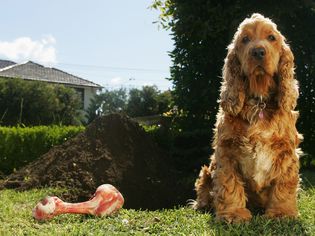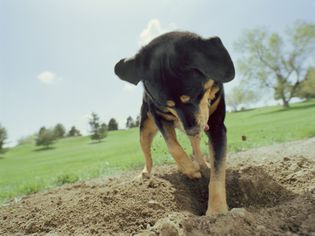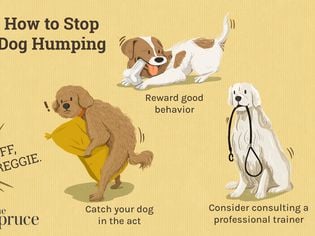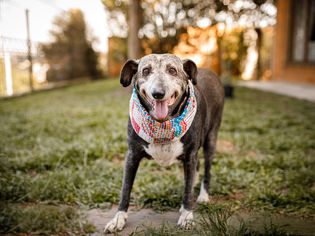Dogs can lick their butts as part of their normal grooming, but excessive butt grooming is not a normal behavior. It's not only unappealing to watch, but it can be indicative of a health problem in your pooch.
In fact, dogs who lick their butt could be signaling a deeper problem, ranging from food or skin allergies to an unexpressed anal gland. Below, we've delved into four of the main reasons dogs lick their butts, as well as some treatments for each of the issues.
Why Do Dogs Lick Their Butts?
A dog will begin to excessively lick their butt due to inflammation and irritation around the area. Although this inflammation and irritation can arise from a variety of reasons, they all require a veterinary visit to determine the cause and to create a treatment plan to put your dog at ease.
1. Anal Glands
Most dog owners know that dogs have anal glands—sometimes called scent glands—located on either side of a dog's rectum. These glands, once full, usually express on their own when your dog has a bowel movement. Sometimes, though, they don't express as they should. This could be because of a loose stool, the anatomy of the gland and duct itself, allergies, or any combination of the three. Pressure begins to build as the glands fill with fluid. Worse yet, as the fluid sits in the glands, it can get thicker, leading to even more pressure. Dogs can feel this built-up pressure and will try to express their anal glands on their own. They can do this by scooting their butt across the floor or by chewing and licking at the rectal area.
2. Intestinal Parasites
Dogs are susceptible to various intestinal parasites, such as hookworms, whipworms, and tapeworms. These can cause loose stool and diarrhea, which can irritate the rectal area. Remember that loose stool can also prevent the anal glands from expressing as they should—and that too can lead to irritation. Sometimes certain intestinal parasites will have eggs that make their way to your dog's rectal area and this can also lead to irritation, which can lead to butt-licking.
3. Skin Allergies & Infections
In dogs, allergies manifest as itchy and inflamed skin. This can include the skin around your dog's rectal area and, sometimes, the anal glands as well. It's also not uncommon for dogs with skin allergies to also have secondary skin infections. This can exasperate the inflammation and irritation already present. If your dog suffers from skin allergies, this definitely can be a contributing factor to your dog's butt licking.
4. Food Allergies
As food is digested, allergens can cause a reaction anywhere in the body, including the anal glands. If your dog is licking their butt repeatedly, they could be experiencing a food allergy. Work with your vet to figure out your dog's food allergy. They will most likely suggest eliminating a certain food for a while to see if the allergies clear up.
Treatment of These Potential Problems
If you feel that your dog is licking its butt excessively, the first thing is to schedule a vet appointment. Regardless of what is causing your dog's rectal irritation, it will require medications to stop the inflammation. Your dog will also need to have their anal glands checked to ensure they aren't full and that the contents within the glands are normal fluid.
Go to the Vet
If your dog's primary issue ends up being related to the anal glands, your vet may prescribe an antibiotic to help with any infection that may be present. The fluid that normally fills up the anal glands has a distinct color and consistency, and expressing them in the vet's office, while possibly uncomfortable, should not be overtly painful. If the contents of the anal glands are thick, discolored, or contain pus, or if your dog reacts painfully, this could be the result of an anal gland infection. If your dog frequently needs its anal glands expressed, either at the vet or the groomer, there are things you can add to their diet such as canned pumpkin to bulk up their stools. There are also supplements available over the counter that are made specifically for this problem in dogs.
Stool Check
Intestinal parasites can be easily diagnosed with a stool check. Most parasitic worms will deposit microscopic eggs within a dog's stool, and these can be detected at your vet. Other intestinal parasites, such as tapeworms, deposit egg packets that can be seen by the naked eye. These can look like small rice grains either within the stool or in the fur around the rectum. If your dog does have intestinal parasites, your vet can easily treat them with a dewormer. Keeping your dog up to date on their monthly oral heartworm prevention can also help as these products prevent the more common intestinal parasites. Getting your dog's stool checked regularly, either once a year or twice yearly is also prudent to help prevent any problems that may be caused by intestinal parasites.
Medication
If your dog is having an active flare-up, with skin irritation, inflammation, and infection, your vet will prescribe medications to soothe the itch and treat the infections. If your dog has potential environmental allergies, there is a blood test that your vet can send to an outside lab for analysis. Once environmental allergens are determined, the vet can start therapy to desensitize your dog's immune system to the allergens.
If you notice your dog licking or chewing at its butt obsessively, call your vet right away. While usually not serious, your vet can help you get to the bottom of your dog's fixation on their own bottom.










Comments on " 4 Reasons Why Your Dog Licks Their Butt" :